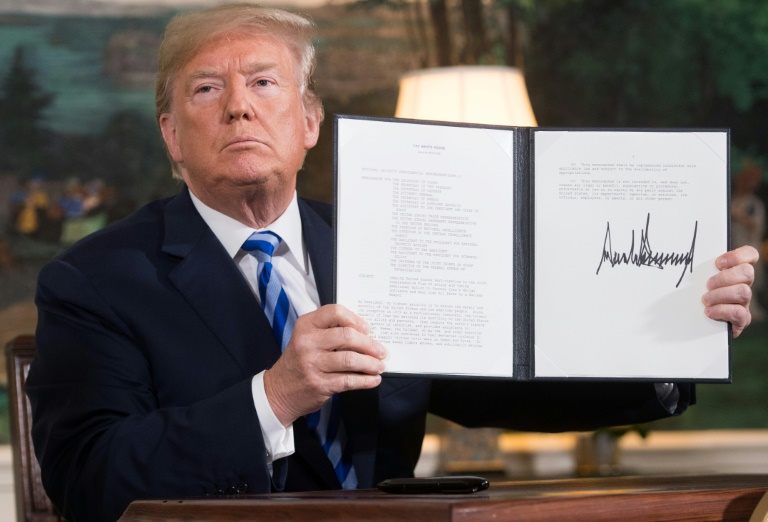Nations vow to save Iran nuclear deal after US pullout

World powers vowed Wednesday to uphold a landmark deal curbing Iran's nuclear programme after President Donald Trump pulled the United States out of the agreement, raising fears of a fresh confrontation with Tehran.
Trump's decision to ditch the accord and reimpose sanctions on the Islamic republic risks overturning years of painstaking diplomacy, worsening instability in the Middle East and threatens foreign companies' business in Iran worth billions of dollars.
"The risks of confrontation are real," warned France's Foreign Minister Jean-Yves Le Drian, adding that Europe would act to "avoid the explosion (of conflict) that risks happening if... no measures are taken."
Iran reacted furiously to Trump's decision, with lawmakers burning a US flag and chanting "Death to America" in the Iranian parliament. But its regional rivals Saudi Arabia and Israel applauded the US move.
- Protecting business in Iran -
Trump's advisor John Bolton said earlier that European firms doing business in Iran have a six-month deadline to wind up investments or risk US sanctions.
European governments are going "to do everything to protect the interests" of their companies, said an official in the French presidency, who asked not to be named.
But Iran's supreme leader Ayatollah Ali Khamenei said Iran too should quit the nuclear deal unless Europeans offer solid guarantees that trade relations would continue.
"If you don't succeed in obtaining a definitive guarantee -- and I really doubt that you can -- at that moment, we cannot continue like this," he told Iran's government in a televised speech.
China said it will maintain "normal economic and trade exchanges" with Iran despite Trump's decision.
Beijing will "remain in dialogue with all parties and continue to devote itself to safeguard and implement the deal," a spokesman said.
Britain, a signatory to the 2015 deal, said it remained committed, with Foreign Secretary Boris Johnson urging Washington "to avoid taking action that would hinder other parties from continuing to make the agreement work."
- Iran 'upholding commitments' -
Slapping aside more than a decade and a half of diplomacy by Britain, China, France, Germany, Iran, Russia and past US administrations, Trump called Tuesday for a "new and lasting deal".
He described the accord as an "embarrassment" to the United States that did nothing to contain Iran's nuclear ambitions.
But the UN's nuclear watchdog, which is charged with ensuring Iran abides by the terms of the deal, said Wednesday Tehran was upholding its "nuclear-related commitments".
"Iran is subject to the world's most robust nuclear verification regime," said International Atomic Energy Agency (IAEA) director-general Yukiya Amano.
The French, British and German foreign ministers will meet Iranian representatives on Monday, Le Drian told RTL radio.
French President Emmanuel Macron was also to speak with his Iranian counterpart Hassan Rouhani by telephone on Wednesday afternoon about "our wish to stay in the agreement," Le Drian said.
- 'Bomb threat' -
Trump said a deal with Iran would have to include not just deeper restrictions on its nuclear programme, but on its ballistic missiles and support for militant groups across the Middle East.
"We will not allow a regime that chants 'Death to America' to gain access to the most deadly weapons on Earth," he said.
"If the regime continues its n
uclear aspirations, it will have bigger problems than it has ever had before."
In response, Rouhani warned Iran could resume uranium enrichment "without limit".
But he also said Iran would discuss its response with other parties to the deal before announcing a decision.
Trump's decision marked a stark diplomatic defeat for Europe, whose leaders begged the US leader to think again.
Bolton insisted that cooperation with Europe on Iran was not over.
The US will "work with the Europeans and others not only on the nuclear issue but on Iran's ballistic missile development, its continuing support for terrorism and its military activities that jeopardise our friends," he told Fox News.
Oil prices on Wednesday hit their highest levels for three and a half years.
The move offers Trump a domestic victory, fulfilling a longstanding campaign promise.
But the long-term impact for US foreign policy and for the Middle East was less clear.
Turkish President Recep Tayyip Erdogan said the United States will "lose in the end" from its decision, which Ankara has warned could provoke "new conflicts" in the region.
Russian President Vladimir Putin expressed his country's "deep concern" over the US withdrawal.
Middle East specialist Denis Bauchard of the French international relations institute IFRI told AFP Trump's move aimed "to cause the fall of a regime that he considers a threat to the security of the United States and Israel."
Some analysts warned the move would also complicate US efforts to reach an agreement with North Korean leader Kim Jong Un over his country's own more advanced weapons programme.
Former CIA director John Brennan said Trump's move "gave North Korea more reason to keep its nukes".